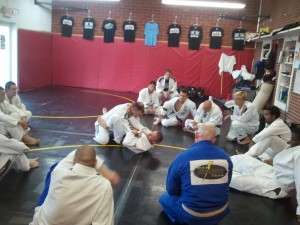 A notebook is an invaluable training tool for BJJ. Keeping track of your training sessions will direct them in such a way that they become focused and efficient. While there are many aspects of your training to include in your notes, some tend to yield better information than others and should be considered indispensable. One thing is for sure though, if you commit to maintaining a notebook you will eventually see the positive effects it can have on your progress and enjoyment of BJJ.
A notebook is an invaluable training tool for BJJ. Keeping track of your training sessions will direct them in such a way that they become focused and efficient. While there are many aspects of your training to include in your notes, some tend to yield better information than others and should be considered indispensable. One thing is for sure though, if you commit to maintaining a notebook you will eventually see the positive effects it can have on your progress and enjoyment of BJJ.
One result of taking notes is “directed training”. Directed training is simply training with a purpose. If you keep track of what doesn’t work in a sparring session you will certainly find holes that exist in your game. The first step to correcting a problem in your game is to find the problem. Once found, you can decide how best to work on that problem. Continue to use your notes as a method of tracking progress. When you are satisfied, move on to another problem.
Methods of tracking your progress will vary as your goals vary. However, you can always find a way of monitoring your development. Some examples include a rep chart, rating rounds, and tracking time spent doing a specific live drill. You can be as general or as specific as you like. Further, the tone of your notes can be indicative of your mental state which can be very informative.
Along with monitoring your progress, note taking can include dietary habits, sleep habits, and conditioning. Your notes should definitely include your class objectives (i.e. how you plan to use your open mat time during a given training session), goals, and notes on what worked/didn’t work during sparring. Keep track of your specific partners. This will show you who your priority training partners should be. You may take notes on the details of a technique that was taught in class; however, in order for this type of information to be truly helpful, it should be paired with immediate review and/or visualization of the position.
While the method and focus of note taking may vary, it is obvious that the information gained represents invaluable data that will allow you to become responsible for your training. Once you take responsibility for your development you can decide the path your training will take. The end effect will be faster progress and, perhaps, a greater appreciation for training BJJ.
The author: Russ Helm, brown belt in BJJ and coach at Revolution BJJ